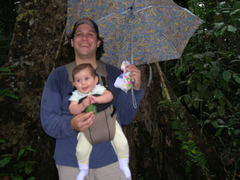|
|
Faculty Research Programs
 |
David D. Ackerly —
Associate Professor,
Integrative Biology
Ackerly Lab
Plant ecology and evolution
Research in my lab addresses
the functional diversity
of terrestrial plants,
with a particular focus on
the California flora. Current
research is focused on
three areas: analysis of the
adaptive value of plant
functional traits; the study of community
assembly processes, based on distributions
of plant traits; and macro-evolutionary
studies of trait evolution, based on the synthesis
of ecological data, recent advances
in phylogenetics, and the development of
new comparative methods. I am particularly
interested in development and analysis
of regional and global databases for
plant ecological traits.
|
 |
Bruce G. Baldwin —
Professor,
Integrative Biology
Baldwin Lab
Systematics and evolution of vascular
plants
My research program
encompasses
vascular plant
systematics,
floristics, and
conservation biology,
with an
emphasis on biosystematic
and
phylogenetic studies. I am particularly interested
in systematic questions that address
evolutionary processes, historical
biogeography and ecology, and relationships
of California plants and their descendant
lineages elsewhere (e.g., Hawaii).
The rich diversity of the California flora
and the extensive literature from evolutionary
research on California plants pose
well-defined and important systematics research
problems for graduate study.
|
 |
Paul Fine —
Assistant Professor,
Integrative Biology
Fine Lab
Tropical plant ecology and evolution
My research investigates the origin and maintenance of Amazonian
rain forest tree diversity. I am especially interested in the role
that biotic interactions and environmental heterogeneity play in the
morphological, functional, and genetic diversity of tropical trees,
and how these factors influence the distribution and speciation of
plants. Current projects include studies of Protium (Burseraceae),
assembly of Amazonian plant communities and the diversification of
the sister families Anacardiaceae and Burseraceae.
|
 |
Brent D. Mishler —
Professor,
Integrative Biology
Mishler Lab
Bryology, systematics, and evolutionary
biology
My personal
research interests
can be
grouped into
two main areas:
(1) empirical
studies
of ecology,
phylogeny, systematics, genomics,
and development of mosses, and (2) the
theoretical basis of systematic and evolutionary
biology including the nature of species,
methods for phylogenetic reconstruction,
and principles of rank-free phylogenetic
classification. My graduate students
are currently involved in research projects
on a broad front including: systematic
studies of mosses, ferns, and angiosperms,
the ecology of reproduction and water
stress, biogeography of the South Pacific,
comparative genomics, and ethnobotany.
|
 |
John W. Taylor — Professor,
Plant and Microbial Biology
Taylor Lab
Systematics, development, and evolution of fungi
My research focuses on the evolution of fungi, including fungal phylogenetic relationships, the timing of deep fungal divergences, species recognition, speciation, species maintenance, selection, and accounting for genetic variation in genomic studies.
|
|






